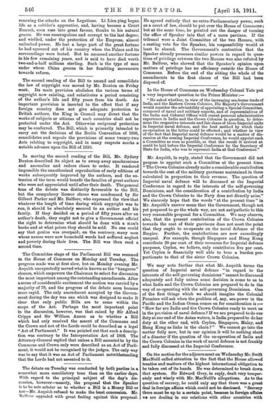The Committee stage of the Parliament Bill was resumed In
the House of Commons on Monday and Tuesday. The progress made was at first slow, but on Monday evening Mr. Asquith unexpectedly moved what is known as the "kangaroo" closure, which empowers the Chairman to select for discussion the most important among the outstanding amendments. After a scene of considerable excitement the motion was carried by a majority of 78, and the progress of the debate soon became more rapid. The only amendment accepted by the Govern- ment during the day was one which was designed to make it clear that only public Bills are to come within the scope of the Act. Perhaps the most important point in the discussion, however, was that raised by Sir Alfred Cripps and Sir William Anson as to whether a Bill which had only received the assent of the Commons and the Crown and not of the Lords could be described as a legal "Act of Parliament." It was pointed out that such a descrip- tion was contrary to the Interpretation Act of 1808. The Attorney-General replied that unless a Bill assented to by the Commons and Crown only were described as an Act of Parli. ment, it would not be recognised by the judges. The only way was to say that it was an Act of Parliament notwithstanding that the Lords had not assented to it.




































 Previous page
Previous page